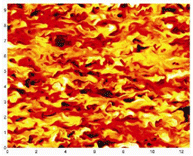KTH / KCSE / Research / Departments / Fluid systems
Fluid systems
The simulation of the behavior of fluid systems is now at a
point where it is possible to perform large scale numerical experiments for
realistic flow cases. For example, the noise generation in
turbulent jets can today be simulated via numerical solutions of
the full Navier-Stokes equations.
Sample projects
Turbulence simulations
It is today possible to perform experiments on turbulent flow using
large scale numerical simulations on supercomputers. Such simulations
give information not available in any conventional laboratory experiment.
An example is a recent study at the department of Mechanics of the effect
of rotation on turbulent flows, particularly the effect of rotation on dispersion
and mixing in turbulent flows. The aim of this study is to increase our
understanding of the dispersion of contaminants and green house gases in
the atmosphere and oceans where the rotation of the earth plays an important
role. Also in many industrial applications such as gas turbines the dispersion
of gaseous fuels or other reacting components is affected by rotation. The
figure presents results from a large scale computation on a three-dimensional
grid with 88 million points. The cut through the three-dimensional domain
shows instantaneous and inhomogeneous distribution of a contaminant in
a turbulent flow, a representation of the dispersion of a pollutant in
the turbulent atmosphere.
Simulations of Flow Induced Noise
In recent years, numerical solutions of aero-acoustical prob-
lems have received increased attention. Both generation and propagation
of sound are of interest. Typical examples of interesting applications
at the Department of Aeronautical and Vehicle Engineering at KTH are to
simulate noise propagation in muflers or the generation and propagation
of noise behind wings. With the help of large computer calculations it
is now possible to use methods developed for solution of flow problems,
so called CFD-methods which until recently
were unrealistic due to the large computer capacity needed for these
problems.
|








